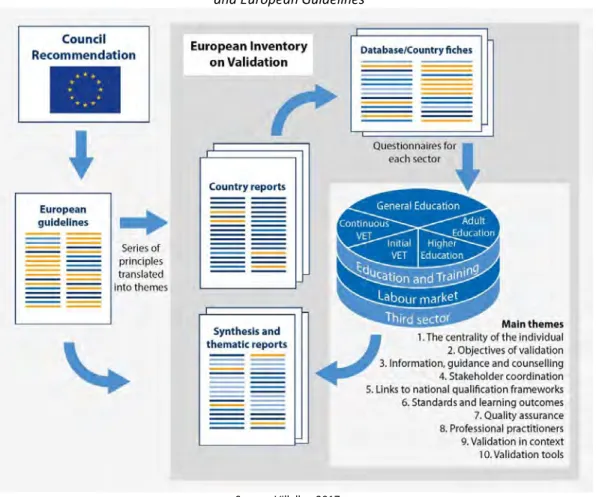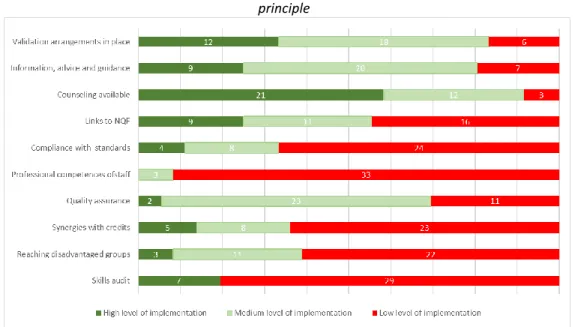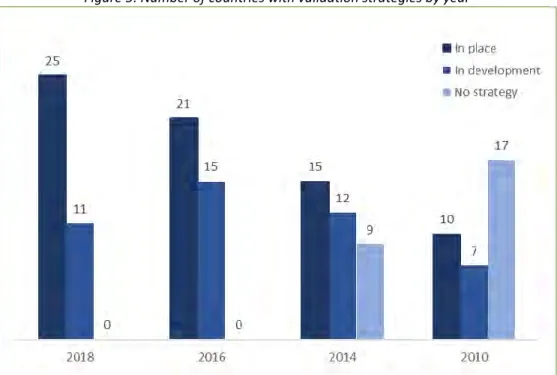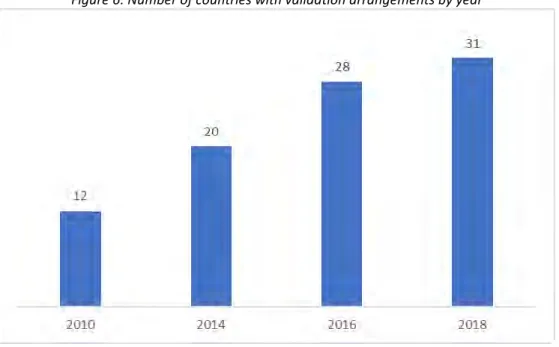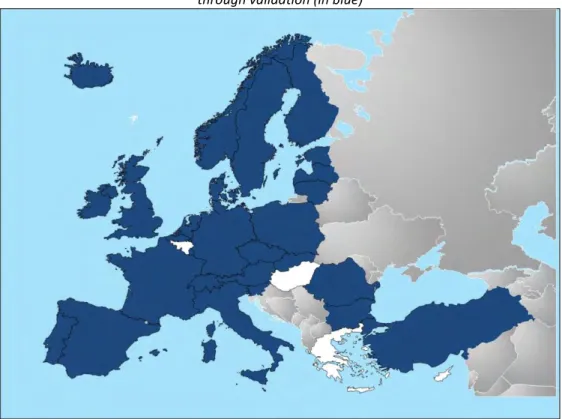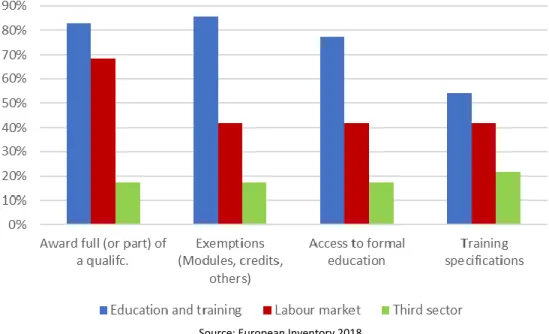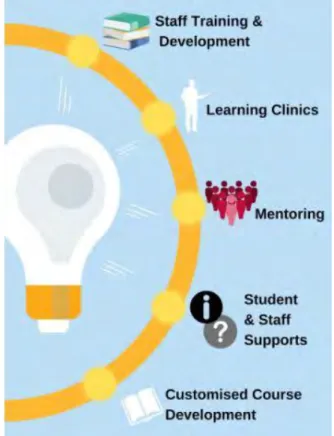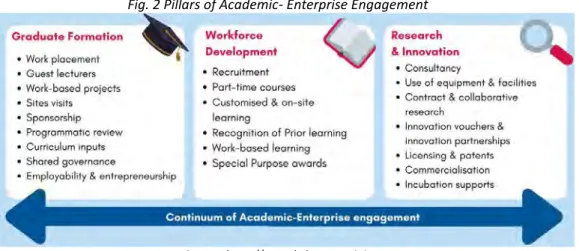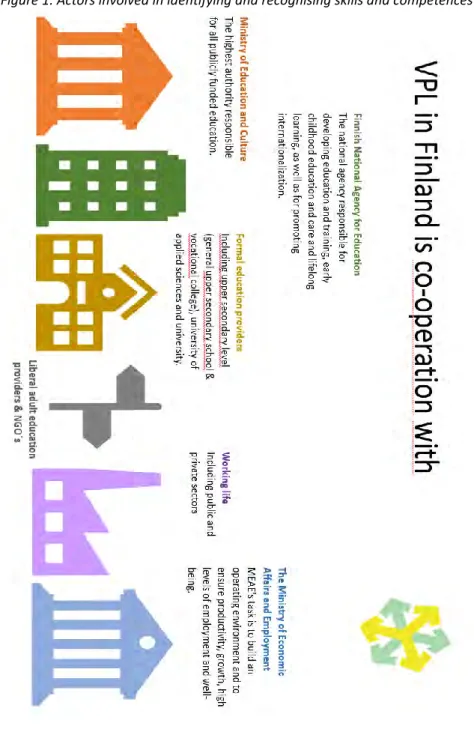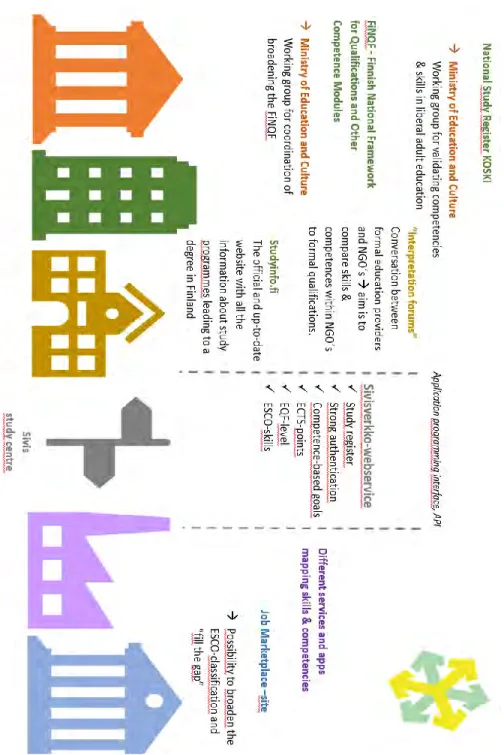Making Policy Work
Validation of Prior Learning for Education
Making Policy Work
Validation of Prior Learning for Education
and the Labour Market
Editors
Ruud Duvekot
Anni Karttunen
Martin Noack
Lieve Van den Brande
August 2020
Series VPL-Biennale nr. 7
Houten/Berlin
Colofon
Title Making Policy Work
Validation of Prior Learning for Education and the Labour Market Series VPL-Biennale nr. 7
Editors Ruud Duvekot (eic), Anni Karttunen, Martin Noack & Lieve Van den Brande
Cover Erik van Beek
Download https://vplbiennale.org/books/
Published by European Centre Valuation Prior Learning, Houten, The Netherlands Bertelsmann Stiftung, Gütersloh, Germany
© EC-VPL/Bertelsmann Stiftung 2020
All rights reserved. Parts of this publication may be reproduced, stored or transmitted in any form under strict conditions of quotation of sources, publisher or authors.
Series VPL Biennale nr. 7
ISBN 9789492085115
2019, May 7-8 Berlin, Germany
That is what learning is. You suddenly understand something you've understood all your life, but in a new way.
Doris Lessing
Living is learning and learning is about trying to live better. We must accept that education and working are both parts of living and should continue from birth until we die.
Preface
The VPL Biennale is a global conference series about systems and practices of Validation of
Prior Learning-(VPL) for lifelong learning, working and living. VPL provides visibility and adds value to all forms of learning. VPL seeks to uncover and unlock talent in the workforce and in society. The VPL Biennale is about sharing experiences, information, knowledge, ideas and visions on VPL as an essential part of lifelong learning. And it is about the creative process of recognizing each other’s successes, problems and solutions in ‘the international VPL-community’.
Across the globe, working and learning systems face big challenges. Much policymaking, piloting and evolution has been done and is continuing on the added value of the learning outcomes approach in National Qualifications Frameworks (NQFs), the effectiveness of Human Resources Management-systems (HRM) and the methods for Validation of Prior Learning. The initiative of the Global VPL Biennale tunes in to these challenges by focusing on the problem-solving potential of Validation of Prior Learning. The VPL Biennales are about sharing information, knowledge, ideas and visions on VPL and about the creative and inspiring process of learning from each other’s successes, problems and solutions in ‘the VPL-world’. The VPL-Biennale concept was designed and initiated by the Foundation European Centre
Valuation Prior Learning (EC-VPL) for the Erasmus+ project ALLinHE in 2012. Its focus was
on social inclusion for all in learning and working environments by developing VPL-approaches to link target groups to learning opportunities. The focus on accessible,
affordable and feasible learning for all remains the leading principle of the VPL-Biennale
concept. This concept is based on the idea of a two-yearly manifestation and congress on proceedings and state of the art in VPL practices, knowledge base, instruments and methodologies, best practices and implementation-strategies for target groups.
After Rotterdam in 2014 and Aarhus in 2017, the 3rd VPL Biennale was hosted by the Bertelsmann Stiftung in Berlin in May 2019. This 3rd Biennale aimed at strengthening the
global platform for policy makers, practitioners, users, researchers and other stakeholders involved in the development and implementation of Validation of Prior Learning in learning and working processes. The 4th Biennale is – due to Covid-19 – expected in 2022. Further
announcements will be made through https://vplbiennale.org.
The VPL-Biennale since 2014
1st 2014 Rotterdam, NL The Power of VPL EC-VPL
2nd 2017 Aarhus, DK The Learner in the Centre NVR
3rd 2019 Berlin, DE Making policy work Bertelsmann Stiftung
The main theme of the 3rd VPL Biennale in 2019 was “Making Policy Work – Validation of
Prior Learning for education and the labour market”.
The mission of the 3rd VPL Biennale therewith was - and still is - to share information,
knowledge, ideas and visions on VPL, learning from each other’s experiences and creating viable solutions in the ‘VPL world’.
The following questions were central to the conference and its work sessions, in which 300 experts from 40 countries participated:
- How can bridges be built among stakeholders from the worlds of business, volunteering, and education in order for VPL results to have value?
- What forms of financing have to be in place in order to make VPL accessible to all learners?
- What kinds of procedures and instruments provide valid results and can cater for a large number of candidates?
- What support structures have to be available in order to reach disadvantaged learners? - What follow-up measures are required for validation to facilitate further learning and
enhanced career paths?
- What issues need to be addressed by laws and regulations for VPL to be effective?
This seventh volume of the Series VPL Biennale reports on relevant experiences as well as good practices and good policies presented at the 3rd VPL Biennale. It provides more insight
in the many ways learners have at their disposal when it comes to making use of their personal learning experiences.
Finally, as a disclaimer, the reader should be aware that the English in this publication might be formulated in American-, Euro-, Latin- or UK-English, depending on the authors of the respective chapters.
Biennale Committee 2019
Martin Noack, Bertelsmann Stiftung, Germany
Heidi Bolton, South African Qualifications Authority (SAQA), South Africa Antra Carlsen, Nordic Network for Adult Learning (NVL)
Ruud Duvekot, European Centre Valuation Prior Learning (EC-VPL), the Netherlands Bodil Husted, NVR – VIA University College, Denmark
Anni Karttunen, Globedu, Finland
Raúl Valdes Cotera, UNESCO Institute for Lifelong Learning Lieve Van den Brande, European Commission, Belgium Ernesto Villalba-Garcia, CEDEFOP, Greece
Content
Preface i
Content iii
Introduction
Ruud Duvekot, Anni Karttunen, Martin Noack & Lieve Van den Brande 1
The Berlin Declaration on Validation of Prior Learning
May 8, 2019 15
Validation of Prior Learning: New Developments and Remaining Challenges
Borhene Chakroun 19
Validation in Europe. State of Play
Ernesto Villalba 25 Transnational Cooperation in VPL Brikena Xhomaqi 41 1 1.1 1.2 1.3 1.4 Organisational Arrangements Introduction Anni Karttunen
Building Sustainability through Organisational Arrangements
Deirdre Goggin
Filled with Skills
Lotta Pakanen
Implementing across Jurisdictions
Christine Wihak
The Importance of Skills Recognition. An ILO Project Review of India, Sri Lanka, Bangladesh, Tanzania and Jordan
Christine Hofmann & Helen Kirsch
53 57 67 73 79 2 2.1 2.2 Financing Introduction
Jennifer Faulkner & Martin Noack
Cost Analysis of Validation of Prior Learning
An De Coen, Kristof Mertens & Miriam Van Hoed
Benefits and effects of validation for individuals and organizations
Patrick Leushuis & Lieve Van den Brande
89 93 107
3 3.1 3.2 3.3 3.4 3.5
Procedures and Instruments
Introduction
Bodil Husted and Antra Carlsen
Quality in Validation. A Nordic model and a Nordic study
Per Andersson, Timo Halttunen and Ulla Nistrup
LEVER UP. Levering transversal competences up for increasing mobility and employability
Lorenza Leita
Facilitating Educational Opportunities for Pilots using Cohort RPL
Pia Fenton & Deirdre Goggin
Digital Open Badge-Driven Learning
Sanna Brauer
#Showyourskills. Four multilingual tools for validating transversal and professional skills with low-skilled, migrants and refugees in Germany
Martin Noack & Lena Wittenbrink
115 119 131 137 147 159 4 4.1 4.2 4.3 4.4 4.5 4.6 Support Structures Introduction Ernesto Villalba
The VPL option for adults in Switzerland
Deli Salini & Patrizia Salzmann
Coordinating Validation and Career Guidance
Ernesto Villalba & Antonio Ranieri
Toteemi. A Nation-wide Development and Research Project in Finland
Marjaana Mäkelä
Competitors or Powerful Allies? Formal TVET versus Recognition of Non-formal and InNon-formal Learning Outcomes
Mona Pielorz & Patrick Werquin
The Italian System of Competence
Roberto Trainito & Stefania Lemme
OBSERVAL-Honduras. Conceptual Framework of the Observatory for the Validation of Professional Competences and Human Capabilities
Celeo Emilio Arias
179 185 199 211 217 225 237 5 5.1 5.2 5.3 5.4 Post-Validation Pathways Introduction Ruud Duvekot
The candidate at the centre in the Banking Sector
Karen Deller
Caught in an Education System designed for a past Era
James Rickabaugh
Dialogical Validation in Dutch Teacher Training
Ruud Duvekot & Klaas Doorlag
Recognition of Prior Learning and Flexible Learning Pathways in South Africa
Heidi Bolton, Joe Samuels, Omotola Akindolani & Takatso Mofokeng
249 253 263 269 279
5.5
5.6
5.7
Validation in Volunteering
Jo Peeters, Jens Aichinger, Karl-Heinz Gerholz, Leonie Weigt, Guus Bremer, Pauline Boivin, Eeva Jeronen, Lotta Pakanen, Ida Adolfová, Alžbeta Brozmanová Gregorová & Mária Joklová
A Personal Experience of the French Validation System
Franz Fuchs-Weikl
Using Validation to Improve the Quality of Portuguese SME’s
Ana Catarina Mendes Garcia & Maria do Carmo Vieira da Silva
291 299 307 6 6.1 6.2 6.3 Legal Foundations Introduction
Lieve Van den Brande
VPL’s Legal Foundation in the Faroe Islands
John Dalsgarð
Validation of non-formal and informal Learning in Flanders
Nathalie Druine
The legal basis of VAE in France
Yolande Fermon 321 327 335 343 7 The VPL-prizes 2019 7.1 Introduction
Category Products: The Balancing Act VIRKE, Norway
349 351
7.2 Category Procedures: IQ Network Brandenburg
IHK-Projektgesellschaft mbH Ostbrandenburg, Germany
359
7.3 Category Policies: Validation Guidelines Regione Piemonte, Italy
371
Introduction
Making Policy Work
Ruud Duvekot, Anni Karttunen, Martin Noack & Lieve Van den Brande
A broad view of the phenomenon of 'Validation of Prior Learning' embraces all learning that takes place consciously and unconsciously, informally, formally and non-formally and above all continuously. Learning can be seen as an individual activity within social processes. Such processes encompass all possible learning, work and living situations and are not necessarily intentional but always - consciously or unconsciously - enrich a person's knowledge, skills and insights. Claxton indicates that learning “comes in many different shapes and sizes. And these
start to kick in at different stages of development. [-] learning is a much wider, richer concept than is captured within current models of education and training”.1 It also includes implicit
and nonintentional learning in its holistic approach:
Learning is what one does to transmute incompetence into competence, ignorance into knowledge. By definition, learning starts in the zone of the unknown, and attempts, via a whole variety of activities, mental and physical, to discover comprehension and expertise.2
This definition supports a social constructivist, broad and social interpretation of learning and encompasses both the width and depth of learning. Jarvis defines such learning as a lifelong activity in which people's continuous learning experiences can be validated and actively exploited for the various purposes for which learning takes place:
Human learning is the combination of processes throughout a lifetime whereby the whole person - body (genetic, physical and biological) and mind (knowledge, skills, attitudes, values, emotions, beliefs and senses) - experiences social situations, the perceived content of which is then transformed cognitively, emotively or practically (or through any combination) and integrated into the individual person's biography resulting in a continually changing (or more experienced) person.3
The definition of Jarvis can be used as a basis for a model of dialogical validation with the aim of making visible and giving value to learning outcomes for example when it comes to linking an individual’s learning experiences with the standards of NQFs and/or human resources management-systems. After all, people learn, also determined by their personality, in different ways, by reflecting on the experiences they have gained and internalizing them, within a given context and by processing theoretical information. People learn consciously
1 Claxton, G. (1999). Wise up: the challenge of lifelong learning. New York/London, Bloomsbury, p.5. 2 Claxton, G., Atkinson, T., Osborn, M. & Wallace, M. (Eds.) (1996). Liberating the Learner: Lessons for
Professional Development in Education. London, Routledge, p. 47.
and unconsciously in all phases and areas of life. Every person is a learning person - it is the
whole person who learns4 - with their own learning style, motivation, experiences and
ambition. Dialogical validation is a valuable way to connect to these unique, individual learning experiences and make the connection(s) between a person's personality, the individual context and the personal enrichment that can be achieved at a qualification-, skill- and/or personal level.
This broad vison of 'learning' fits perfectly in the concept of 'the learning society'.5 The
learning society can best be described as a society in which learning is important and valuable for everyone, in which people are encouraged to continue learning throughout their lives and in which the opportunities to learn are accessible to all. In such a learning society, continuous learning is important for both the individual as well as for society and its organisations and agencies. Important in this context is to understand that learning isn’t a process that is mainly driven by the learning system or the social system, but one that also requires people to play an active and engaged role.
The International Commission on the Development of Education, chaired by Edgar Faure and established by UNESCO in 1971, set the tone in the debate on creating such a learning society in which the learner is central and in connection with other partners in society wants, can and is allowed to develop throughout life:
If learning involves all of one's life, in the sense of both time-span and diversity, and all of society, including its social and economic as well as its educational resources, then we must go even further than the necessary overhaul of 'educational systems' until we reach the stage of a learning society. For these are the true proportions of the challenge education will be facing in the future.6
Whereas the vision of Faure, et al was far from feasible, in the year 2020 essential preconditions for realizing such a learning society have finally been met: (1) it is an accepted reality that a learner is able to take account of her/his learning history and thus prevent unnecessary learning, (2) the learning process can be organized in a learning-pathway independent manner and (3) the social function of learning is super accessible by making each learner co-owner of their own learning process.
The pillars of Faure's vision on learning from the 1970s that come to life in the present day are (a) validating prior learning for further learning purposes, (b) facilitating learning pathway-independent learning opportunities and (c) putting the learner truly at the centre. In this sense, the 3rd VPL Biennale takes stock of an unfolding reality in which the learner
himself is the protagonist of lifelong learning. The extent to which policy contributes to this reality is the central theme of this 3rd Biennale.
Making Policy Work
Learners are owners of their learning history and are more and more allowed to capitalise on the personal richness that this history holds. That’s what Validation of Prior Learning is about:
4 Jarvis, P. (2006). Towards a Comprehensive Theory of Human Learning. London, Routledge, p. 50.
5 Faure, E., Herrera, F., Kaddoura, A., Lopes, H., Petrovsky, A.V., Rahnema, M. & Champion Ward, F. (1972).
Learning to be. The world of education today and tomorrow. Paris, UNESCO.
1. Ensuring a learner’s awareness of her/his true potential for the sake of effectively reaching out to a learning objective: a certificate and qualification, employability or mobility, social inclusion and participation, empowerment and personal development. 2. Assisting in the articulation of the need for competences and skills on the labour market,
in social systems, human resources management and civil services.
3. Linking a learner’s value to a personalised learning strategy that fits in well with the demand for competences and skills in society.
4. Stimulating and affording an active role of the learner in lifelong strategies.
As the companion to the 3rd VPL Biennale in Berlin, Germany on May 7-8, 2019, this
Biennale-book provides insight into the many ways for designing and applying VPL across the globe. Enriching articles were written for and presented at this Biennale, demonstrating the international diversity in utilisation of Validation of Prior Learning-systematics. It’s a variety that spans a global learning culture of providing VPL-services for a diversity of purposes, enhancing UNESCO’s kaleidoscope of initiatives on the role of validation and learning for social inclusion and participation, creating a learner-centred attitude in the European Union, the pursuit of lifelong learning strategies in Latin America, South Africa’s push forward with a national strategy for the recognition of prior learning, Canada’s further development of validation across jurisdictions, the next steps taken in personalising learning by integrating dialogical validation into learning strategies in the USA and the Netherlands, the many cases across the world focused on linking VPL to work-based learning, the Nordic cooperation on quality-assured linkages between the social and learning systems and the learner, and many other contributions.
The Berlin Declaration
To empower the further implementation of VPL, the global VPL community set out to formulate overarching principles for achieving a robust and effective VPL-system all over the world. The Berlin Declaration on Validation of Prior Learning holds six paragraphs, mirroring the six policy tracks in the programme of the 3rd VPL Biennale. The participants of the
conference worked hard for a common goal: to give the VPL community a founding document. Being the product of a bottom-up process, the Berlin Declaration is meant to act as a grassroots push for stakeholders and policy makers to make validation policies bolder, more effective and more inclusive. It aspires to be an international benchmark for validation systems and thereby is meant to establish a common language and common goals among the practitioners, stakeholders and policy makers.
The keynotes
The 3rd Biennale provided a platform for various organizations and institutions that advocate lifelong learning strategies in general and VPL in particular. The keynotes of UNESCO, Cedefop and the Lifelong Learning Platform are featured in this book.
Borhene Chakroun (UNESCO) states that, notwithstanding the diversity of contexts across
the globe, there is consensus on the need to promote Recognition, Validation and
Accreditation of learning (RVA) to achieve the Sustainable Development Goals (SDG) 4 and 8
and more broadly the 2030 Sustainable Development Agenda of the United Nations. SDG4 aims at Quality Education to ensure inclusive and equitable quality education and promote lifelong learning opportunities for all. SDG8 targets Decent Work and Economic Development for promoting sustained, inclusive and sustainable economic growth.
Yet whilst RVA occupies an important place on policy agendas, the capacity of countries to develop at scale quality RVA systems and to respond to multiple and elevated demands is uneven, and in many countries often limited. There is a dearth of data on the scale, needs, beneficiaries, outcomes of RVA schemes which affect the capacity of actions of decision makers and the international community.
Furthermore, RVA is increasingly placed in the context of changing labour markets, the need to meet the 2020 Sustainable Development Agenda and the ideal of leaving no one behind. The author outlines major areas that should be considered to address these questions. The text starts by placing RVA in the context of the SDGs, then takes into consideration the implication of changes in the labour market. The last sections highlight the importance of evidence based RVA policies and schemes and offer a set of areas for actions. The concluding section sums up the key messages for making RVA-policy work.
Ernesto Villalba (Cedefop) presents an overview of the situation concerning validation of
non-formal and informal learning in Europe. Validation in this context is about making all learning count. It is increasingly present in European and national policies, underpinned by two main principles: (a) all learning, irrespectively of how it has been acquired is valuable and (b) informal and non-formal learning complement formal learning. It is meant to add to and work together with the learning taking place inside formal education institutions. Validation makes visible the diverse and rich learning of individuals that take place outside formal education. Most of our learning takes place outside formal education and training – at home, in the workplace or through leisure activities. Around 45% of adults (aged 25-64) report participating in training in the last year, only 5.8 do it in formal education institutions. It is important to develop ways in which we can understand and communicate the outcomes of the individual’s learning in all possible settings. Validation is the tool to achieve this understanding. In the Council Recommendation of 2012, validation was defined as a process of confirmation by an authorised body that an individual has acquired learning outcomes measured against a relevant standard and consists of four distinct phases.
The 2018 European Inventory of Validation of Non-formal and Informal Learning constitutes an important source of information of the systems and ways in which European Member States are implementing validation. It constitutes an important tool for countries to learn from each other. The 2018 edition shows that countries are progressing at different speeds towards the objectives set by the 2012 Recommendation.
Brikena Xhomaqi (Lifelong Learning Platform) states that it was clear from the outcomes of
previous Peer Learning Activities of the European Qualification Framework Advisory Group on validation, the Validation Festival in June 2018 and the international VPL Biennale in Berlin of May 2019 that the exchange between validation practitioners across countries is vital and instrumental. The Berlin Declaration on VPL called upon relevant stakeholders to collaborate and cooperate so that VPL holds value in society and can have a high level of recognition. The results of these manifestations confirmed a great willingness to support professional network development. The professional development and the creation of a common language among VPL-practitioners help increase the coherence and consistency of validation-practices across countries, within the diversity of national and sector-based validation systems.
People who work with candidates on the ground floor can benefit from the mutual exchange of successful (and unsuccessful) practices, professional advice from peers, and in general learn from people who do the same job in another institute, company, region, sector or country.
The Biennale Tracks
VPL gives visibility and value to all forms of learning and seeks to uncover and unlock latent talent in the workforce and in society. The 3rd VPL Biennale is for policy makers, researchers,
users, practitioners, and other stakeholders involved in the development and implementation of Validation of Prior Learning. It`s about sharing knowledge, ideas and visions of VPL, learning from each other`s experiences and creating viable solutions in the ‘VPL world’. The Biennale tracks cover all aspects and dimensions pertaining to sound utilization of Validation of Prior Learning-systematics.
Track 1 – organizational arrangements
Organisational arrangements are fundamental to the success of a VPL system. Key stakeholders’ areas of responsibility need to be clearly demarcated, with extensive collaboration and cooperation across sectors.
Anni Karttunen introduces this paragraph of the Berlin Declaration and paves the way for the
four contributions that concentrate on the principles developed of this conference track. These contributions come from Ireland, Finland, Canada and the ILO.
Deirdre Goggin (Ireland) reflects on the question ‘How can bridges be built between
stakeholders from the worlds of business, volunteering and education in order for VPL results to have value? Recognition of Prior Learning (RPL) has existed in Cork Institute of Technology (CIT) since 1999 as part of its central services to all learners for access, transfer and progression. The sustainability of RPL within CIT is a result of strategic decisions and the multi-faceted approach has been adopted and embedded by CIT to ensure that validation is implemented, used and valued. This paper outlines the policy, systems and processes CIT has adopted to meet the needs of all stakeholders including learners, staff, institution and industry. It focusses on the strategy and policy of the institution which has evolved and developed through dialogue and in the establishment of the CIT Extended Campus, a central unit which facilitates CITs relationships and engagements with stakeholders. This paper also outlines the challenges encountered and solutions which CIT enabled in response to their role in validation over the past twenty years.
Lotta Pakanen (Finland) aims at enhancing the validation of prior learning by NGOs. So far,
Finnish NGOs have already undertaken important work to enhance VPL. An essential part of the work has included influencing and informing policy makers and formal educational institutions about liberal adult education and the skills and competencies gained by participating in courses and voluntary work. NGOs have ‘studyfied’ their activities and planned their courses and content of volunteering to be more competence-based. Study centres have provided skill certificates, digital badges and formal study registers. To enhance comparability, NGOs have linked their skills and competences to various frames of references like the European key competencies for LLL, EQF and ESCO. The Finnish Scouts have taken a step ahead and developed a digital tool to help NGOs and formal educational institutions compare their learning outcomes.
Christine Wihak (Canada) examines how consistency in validation across jurisdictions can be
achieved through non-legislated means. Canada is a federated democracy whose constitution gives power to each provincial/territorial government to regulate health
professions. Although each province/territory sets standards for nursing competence, much consistency has been achieved through voluntary inter-jurisdictional co-operation among regulatory bodies and professional associations.
Internationally Educated Nurses (IEN) seeking to be licensed for practice in Canada commonly have to undertake a validation process to determine that their combination of formal education and work experience have given them Substantially Equivalent Competence to a nurse educated in Canada. This case study reports how validation is carried out in two Canadian jurisdictions – British Columbia and Nova Scotia -- examining the similarities and differences faced by IENs undergoing Validation in the two provinces. The paper highlights how considerable consistency in Validation can be obtained without state intervention, by drawing on inter-jurisdictional, intra-professional co-operation and shared understandings.
Christine Hofmann and Helen Kirsch (ILO, Switzerland) provide insight into how the
International Labour Organization is supporting countries in the design of RPL systems and into the implementation of RPL pilots. While validation and recognition of prior learning (RPL) can provide access to education and training, it can also improve access to the labour market, to decent jobs commensurate with the person’s skills and competences or facilitate career progression. Among others, the ILO supports Tanzania and Malawi in the establishment and implementation of an RPL system, as well as Bangladesh and Sri Lanka with a specific focus on migrant workers, supports SADC in the development of guidelines for RPL, evaluates pilot RPL schemes in India and implements an RPL pilot in Jordan for Syrian refugees and Jordanians.
Key success factors in the implementation of RPL pilots or systems that aim for labour market recognition include a trusted and transparent process with involvement of representatives of employers and workers in the design and oversight of the system, and the tying of additional benefits such as complementary training, access to labour markets, occupational licenses or financing. The ILO published a guide for RPL (Recognition of Prior Learning: Key success factors and the building blocks of an effective system), a learning package on RPL and a Policy brief on the subject.
Track 2 – Financing
Validation costs money. For this reason, the creation of financing structures and a response to the question of who pays what towards the cost of validation or qualification procedure are of crucial significance.
Jennifer Faulkner and Martin Noack introduce this paragraph of the Berlin Declaration and
pave the way for the two contributions that concentrate on the costs and benefits of VPL. These contributions come from Belgium and the Netherlands.
An De Coen, Kristof Mertens and Miriam Van Hoed (Belgium) present a case study by the
Flemish government in Belgium on how to calculate the costs of VPL. The Flemish government strives for an integrated VPL policy across its departments. In doing so, particular attention has been given to the financing of the VPL procedure since a sustainable policy has to be financially sound. Therefore, by order of the Flemish government, IDEA Consult analysed the budget that is required to implement an integrated VPL procedure and the potential return at the level of the Flemish region as accurately as possible.
The results of the case study reveal how much time and money it takes on average to finance a VPL trajectory. The analysis shows in detail the required investments for both participants
and providers as both parties have to perform different actions when going through the process from start to finish. Moreover, by using the standard cost model, the costs are visible for each stage in the VPL procedure. This approach shows which actions require the largest investments and to what extent efficiency gains could be obtained in order to organize VPL at a substantial scale.
Patrick Leushuis (the Netherlands) and Lieve Van den Brande (Belgium) present the
outcomes of a research into the benefits and effects of validation for individuals and organizations in the Netherlands and its linkage with the European peer-learning activity in 2017 on funding validation. After several years of promoting and stimulating validation, the Dutch Government wanted to have more insight into the effects of validation for both individuals and organizations. The subsequent research provided evidence for significant benefits of validation, regarding career development, job matching and higher income. The research also gave insight into conditions that need to be met in order to realize the articulated benefits, especially related to human resources management policies and activities in organizations in the context of (the evolution of) the system for validation, which is aimed at both validation in education (VET and HE) and validation in the labour market.
Track 3 – Procedures and instruments
Procedures include structured pathways for validation of learning outcomes, training for assessors and guides, as well as mechanisms for quality assurance of validation processes. Instruments are tools that make learning outcomes visible or help to assess them.
Bodil Husted and Antra Carlsen introduce this paragraph of the Berlin Declaration and set
the stage for the five contributions that illustrate the principles of this track. These contributions come from the Nordic countries, Italy, Ireland, Finland and Germany.
Per Andersson (Sweden), Timo Halttunen (Finland) and Ulla Nistrup (Denmark) reflect on the
question whether a quality model can enhance performance of VPL and be as well a benchmark-model for national VPL arrangements.
In the Nordic quality model, the individual is in the center, a fact that users have found very helpful. The Nordic Model can be seen as a structured way to assess the current situation in validation at an institutional level and to identify areas in need of further development. A monitoring tool and a set of indicators (Road Map 2018) has been created in cooperation and is used to illustrate the validation process from mapping and assessment of prior competences all the way to how these results can benefit the individual and society. The Road Map highlights the central aspects that must be covered to facilitate a functional and smooth validation system. It can be used nationally as a development tool and for comparison among the countries. The Nordic region is in the process of benchmarking since autumn 2018. Strong focus is also put on quality development.
A recent research project on the Nordic quality model points out strategically important parts and phases in the validation process from a quality assurance perspective. The model's broad approach has been useful in identifying further development areas of all participating educational institutions, regardless of country or organization. The factors presented in the Nordic quality model strengthen this framework by encouraging the actors to discuss standardization, reliability and measurement in validation.
Lorenza Leita (Italy) gives insight in the tool of LEVER UP. This tool aims at levering transversal
competences up in order to increase mobility and employability. LEVER UP values informal learning and transversal competences experienced in contexts such as volunteering to increase employability, social responsibility and mobility.
The EU-project ‘LEVER UP’ implemented an integrated system consisting of (1) a competence model, referenced to EQF, the eight EU key competences, and in due course to the EU mobility tools, (2) an internationally tested VPL evidence-based process and (3) a toolkit for supporting candidates, guides and assessors. The multilanguage solution (EN, NL, ES, PL, FR, IT) provides e-learning and blended courses for tutors and assessors. Open Badges are the credentials for the successful achievement in staff training and competence validation. Relations to ECVET mechanisms are also under evaluation. Several pilots tested the system with VET, the job market and volunteering. In Italy it is directly exploited in the Lombardy Region and links with the national contacts for NQF and EUROPASS to keep it more and more aligned and referenced, also in consideration of the upcoming ESCO. LEVER UP raises great interest and appreciation from all the external actors involved. It is considered an effective and operative lifelong learning solution to give visibility and potentially transfer the individual transversal competences from a context to another.
Pia Fenton and Deirdre Goggin (Ireland) explain how a VPL-programme for pilots can be
embedded in university-programming.
The lifestyle and, indeed workstyle, of pilots has long proved an impediment to the attainment of third level qualifications while maintaining active and full participation in the workforce. Equally, the significant investment in pilot training has been poorly reflected in mechanisms of advanced entry to college and university programmes. This poses a quandary for those of us in Higher Education which requires quick resolution for this critical element of the airline industry. Cork Institute of Technology has developed a programme which, by design, reflects the training foundations and career trajectories of qualified pilots in a more holistic way. Through Recognition of Prior Learning (RPL) the programme recognizes the extensive learning involved in becoming a pilot at commercial level. The underpinning technical expertise, the competences developed and tested along the way, and the attendant awareness of the industry are critical pieces of learning comparable to that developed in many degrees. The RPL process accepts the value of this learning and through a rigorous and quality-assured means equates this to years 1 and 2 of a 4-year Bachelor of Arts (Honours) in International Business with Aviation Studies.
Sanna Brauer (Finland) demonstrates the merits of digital open badge-driven learning.
Digital open badges are gaining popularity as a means of identification and recognition of competences acquired via different modes of learning. Meanwhile new ways to motivate, scaffold and assess competence-based learning processes in professional development are emerging. This paper offers insights and examples of applying the competence-based approach, digital open badges and gamification in professional development to meet individual needs for working life. In addition, it represents the current state of emerging national ecosystems related to open badges in Finland. It is essential that the standards and guidelines are developed on a national and European level; however, to serve the students, trainers need to learn how to apply the competence-based approach in practice and further develop their digital pedagogical competences and practical applications. This contribution offers a brief summary of the first European doctoral dissertation to address digital open badges and digital open badge-driven learning. The thesis represents a novel application of
descriptive statistical methodology to the context of educational research. The primary results culminate in defining a digital open badge-driven learning process grounded on the badge constellation of competences. The entity of badge-driven learning includes learning materials, badge criteria, instructional badging, scaffolding and peer support.
Martin Noack and Lena Wittenbrink (Germany) address the issue of more than four million
employed people in Germany sharing the problem that they have no proof of their skills and therewith are being considered formally low-qualified. Many of them have a migration background. In their contribution they explain how the initiative #Showyourskills offers a variety of instruments to make informally and non-formally acquired competences visible. Each instrument is available in at least six languages and is based on illustrations, pictures or videos – and usage is free for clients.
Two of these instruments are analogue and support direct, face-to-face interaction between the candidate and a counsellor. The other two tools are digital and can support assessment practically independent from a guided situation.
Track 4 – Support Structures
Access to guidance is essential for learners trying to navigate recognition procedures. A combination of face-to-face support and online tools and information form a valuable component of any functioning VPL system.
Ernesto Villalba introduces this track of the Berlin Declaration and paves the way for the six
contributions that concentrate on the principles of this track. These contributions come from Switzerland, Cedefop, Finland, Germany/France, Italy and Honduras.
Deli Salini and Patrizia Salzmann (Switzerland) state that Validation of prior learning (VPL) is
one of several pathways for adults in Switzerland to obtain a formal qualification of initial vocational education and training (IVET), that is, a Federal VET diploma (FDVET) or a Federal VET certificate (FCVET). This contribution describes the VPL option and how it is embedded in the broader framework of IVET for adults in Switzerland. In particular, it addresses the forms of support offered when choosing the VPL option. They outline the Swiss educational system and discuss the policies relevant to VPL procedures in Switzerland, both in general and in IVET. They also describe the different pathways for adults in Switzerland to obtain a formal IVET qualification at the upper-secondary level. As a conclusion, they discuss how VPL practices and in particular, the support structure for applicants, are consistent with the principles of the Berlin Declaration on VPL.
Ernesto Villalba and Antonio Ranieri (Cedefop) reflect upon Cedefop’s exploration in 2019
of how coordination between career guidance and validation of non-formal and informal learning can be improved. Validation and guidance help individuals, organisations and Member States adapt to career challenges and create successful lifelong learning systems. However, little is known about how they are linked in practice and how this connection can be made more efficient. Building on Cedefop’s expertise in the two areas, this study – based on an analysis of 13 practices from 12 countries – points to three critical success factors: a. Comprehensiveness: adequate information provision and guidance before a decision to
b. Coherence: use of common qualifications or competence standards, occupational standards or other reference frameworks in all the stages of the practice to identify, document and assess skills.
c. Quality of staff, resources, competences, and tools used.
The study concludes with policy recommendations on how to improve the links between guidance and validation.
Marjaana Mäkelä (Finland) analyses the integration of work and degree studies as a topical
field of development work of Finnish higher education institutions. In the structure of national education, this sector is divided in two pillars: research-oriented universities and universities of applied sciences. Both pillars encounter the current societal situation where students work long hours weekly, alongside their degree studies. Moreover, an increasing number of students may have extensive work experience already when they start their study cycle in higher education, and this applies in particular to students entering part-time programs, targeted for professionals with prior vocational qualifications and/or practical experience in the field of study. Mechanisms facilitating this integration developed in Finnish higher education institutes, as they are articulated across actions of a nation-wide project
Toteemi, are the topic of this contribution.
Mona Pielorz and Patrick Werquin (Germany & France) reflect on the learning and validating
systems of Germany and France for debating the question whether formal technical vocational education and training versus recognition of non-formal and informal learning competitors are or not.
Roberto Trainito and Stefania Lemme (Italy) define the state-of-the-art of the Italian
certification system of the competences, at national and regional levels. They explain the potential of the Atlas of Work and Qualifications together with its functional use for the competences’ identification, validation and certification (IVC), the Italian way for VPL. The analysis demonstrates how the Atlas of Work and Qualifications allows correlation and equivalence between regional qualifications (through competence description) and describes the content of work in terms of activities (tasks, assignments, etc.) and potentially deliverable product/services in carrying out the activities described
Celeo Emilio Arias (Honduras) introduces the Observal-Honduras. The objective of this
project is to develop an interdisciplinary conceptual framework for an observatory identifying concepts and theoretical constructs that have been used for analysing the recognition of
'previous, current and prospective learning'. In a second step Observal-Honduras aims to
conceptualize and operationalize the identified concepts and constructs. This article demonstrates that identified concepts and/or constructs can be found interconnected and/or dispersed in different approaches, models and perspectives within the study field of the ‘Recognition of Prior Learning (RPL)’. This is valuable for future research; and for consolidation and maturation of dominant and emerging concepts and constructs, both in the study field at international level, as well as in the Honduran and Latin American context. Furthermore, there is a great opportunity for the RPL study field to consider, in addition to Prior Learning, the integration with Current and Prospective Learning.
Track 5 – Post-validation Pathways
The value of VPL results on the job market and to education providers determines the success of a VPL system. VPL results must facilitate an individual’s mobility, opening up pathways which were previously closed off.
Ruud Duvekot introduces this paragraph of the Berlin Declaration and paves the way for the
seven contributions that concentrate on the principles of this track. These contributions come from South Africa (2), the United States of America, the Netherlands, Austria, Portugal and the EU-project ImproVal.
Karen Deller (South Africa) puts the candidate at the centre with an online RPL portal. RPL is
often a tool for the empowerment of disadvantaged workers. But they are frequently unable to access RPL in a country like South Africa (due to various factors such as proximity to an RPL provider, cost of RPL and language). The conundrum of access has been solved in South Africa’s banking sector through the launch of an online RPL portal. After RPL, the portal feeds into various post RPL pathways (including learning, career support and guidance and work opportunities). The benefits of an online portal and its role in enabling both RPL itself as well as progression post-RPL is presented in this contribution.
James Rickabaugh (USA) claims that most formal educational systems are designed to
prepare students to be taught. Yet, today’s young people face a future that will require them to be skilled, independent learners, regardless of the careers they choose or whether a formal instructional support is always present. While it will continue to remain important to develop key academic skills and knowledge, we know that success in a rapidly changing world will also demand the capacity and desire for lifelong learning.
The Institute for Personalized Learning in Wisconsin, USA is dedicated to meeting the challenge of nurturing powerful learners, who have the capacity and drive to learn for life. This article addresses the underlying theory and research supporting this approach and features examples of personalized, learner-centered practices. The implications are debated of a redesigned learning ecosystem that develops the capacity of all young people to learn without always having to depend on formal structures and professional instruction. The implications for developing capable, independent adult learners for success in work and life are explored as well.
Ruud Duvekot and Klaas Doorlag (The Netherlands) elaborate on the process of Dialogical
Validation in teacher-training programmes in The Netherlands.
When flexibilizing learning, translating personal learning experiences - formally, non-formally or informally acquired - into recognizable learning outcomes is a critical success factor. This translation can be organized effectively in a dialogue between student and university-teacher through the validation of personal learning outcomes in a portfolio-steered process. Such dialogical validation is facilitated in the Netherlands at Utrecht University AS in teacher-training. Dialogic validation is defined as learning-independent assessment of prior learning experiences and advice on further learning, aiming at realizing a personalized learning trajectory. The learner and the ‘teacher’ act together – in dialogue – as co-owners of this process. It is a step forward from analytical assessment towards a holistic approach in which the learner is assessed as a complete and unique individual in her prior learning, working and living experiences. The result of dialogic validation is a personalized learning process in terms of content, form and meaning for the learning outcomes that a student still needs to achieve.
Dialogic validation has been introduced in bachelor-programmes for teachers in basic education (groepsleerkracht) and in secondary education (zij-instroom).
Heidi Bolton, Joe Samuels, Omotola Akindolani and Takatso Mofokeng (South Africa) sketch
the story of Recognition of Prior Learning (RPL) development in South Africa between 1995 and the present (2020), in a system where access to learning, redress, progression along learning pathways, quality, transparency and the integration of education and training are key. The paper has five parts. Firstly, it sketches the context for RPL in the country. Secondly, it explains how RPL is understood in South Africa, and RPL policy development. Thirdly, it analyses RPL developments since 1995. Fourth, it presents the latest RPL data in the National Learners’ Records Database (NLRD) managed by the South African Qualifications Authority (SAQA). The paper closes with reflections on these developments and their implications for access and redress, flexible learning pathways and lifelong learning.
Jo Peeters (The Netherlands) and Jens Aichinger, Karl-Heinz Gerholz, Leonie Weigt, Guus Bremer, Pauline Boivin, Eeva Jeronen, Lotta Pakanen, Ida Adolfová, Alžbeta Brozmanová Gregorová and Mária Joklová (Europe) present a study on the outcomes and impact when
validating volunteer’s competences. Education and learning are substantial and constant parts of everyone’s life. Even though the concept of learning is often associated with courses, assignments and exams (formal learning), knowledge, skills and competences can also be acquired in many other ways (informal/non-formal learning). Sometimes, we are not even aware of all the activities from which we educate ourselves and which competences we might have developed through them. Let alone when volunteering.
Franz Fuchs-Weikl (Austria) presents a personal experience of the French validation system.
On November 19, 2018 he obtained the university degree "DURIF" (Diplôme d'Université
Responsable en Ingénierie de Formation) at the Sorbonne in Paris by means of the recognition
of competence. This is a French Bachelor's level qualification in the field of education management. The prerequisite for this is admission by university, the preparation of a dossier and its ‘defence’ in front of a jury. He describes the entire process of one and a half year, from initial consultation to completion. He was the first non-native French speaker at the Sorbonne to undergo recognition of competences or a VAE (Validation des Acquis de
l'Expérience).
Ana Catarina Mendes Garcia and Maria do Carmo Vieira da Silva (Portugal) problematize
the question ‘to what extent can a training model, based on the VPL approach and supported by principles of the educational sciences, contribute to individual empowerment and, consequently, to an improvement in the organizational quality of Portuguese SMEs?’. They found that the training processes presented valued learning in the workplace. However, the definition of a training assessment methodology focused on the development of individual competences and the combination of non-formal and informal learning seemed to be lacking. Based on these findings they suggest a dynamic intervention strategy by means of a training model based on VPL.
Track 6 – Legal Foundations
A clear legal framework, which coordinates and oversees quality provision of VPL, is the bedrock of a sustainable VPL system.
Lieve Van den Brande introduces this paragraph of the Berlin Declaration and paves the way
for the three contributions that concentrate on the principles of this track. These contributions come from the Faroe Islands, Belgium and France.
John Dalsgarð (Faroe Islands) explicates how the Faroe Islands established a national VPL
system with a proper legal foundation. The article sheds light on the main obstacles in the implementation process, including the unsolved question of funding, the scepticism from parts of the labour market, and the question on how best to provide suitable information, both to the public and the relevant stakeholders.
Preparations for a legal VPL system in the Faroe Islands started in 2011 as a result of a cooperation between the Vocational Education and Training Office (Yrkisdepilin) in the Ministry of Education, and the NVL (Nordic Network for Adult Learning). A conference arranged by the VET Office and NVL in 2011 led to a working group being established with representatives from the labor market, trade unions and the employers’ association, the educational system, all relevant ministries and the unemployment office. The aim was to gain more knowledge and share experiences regarding validation and training in the Faroe Islands in comparison to other Nordic countries. Furthermore, this working group was tasked to suggest and describe different possibilities for establishing a Faroese VPL system. The result of this work was new legislation on validation, passed in the parliament in May 2014.
Nathalie Druine (Belgium) presents a concept for an integrated framework for VNIL [EVC,
Erkennen van verworven competenties] as developed in Flanders, Belgium.
Regulations for validation of non-formal and informal learning exist in Flanders (Belgium) in several sectors and policy domains but an integrated approach to the validation of non-formal and innon-formal learning (VNIL) was still missing. For many years, attempts were made to reduce the fragmentation and to increase the societal impact of validation so as to increase the numbers of validation uptake. In July 2015, the concept for an integrated framework for VNIL (EVC, Erkennen van verworven competenties/recognition of acquired competences) was approved by the Flemish Government. This was the start for a long-lasting regulatory process mainly driven by the ministers of education and work but with the involvement of many stakeholders.
Yolande Fermon (France) focuses on the legal basis for Validation des Acquis de l’Expérience
(VAE) in France. Recognition and Validation of Prior Learning has been implemented in France long before the 2012 European Recommendation on validation of non-formal and informal learning. The best-known validation procedure is the VAE created in January 2002. With this law a new right was given to French citizens, the right to have their skills and competences assessed and validated. VAE represents in France a means to access to qualifications just like education, apprenticeship or further education.
The article explains how the law and the different regulatory texts have organized the implementation of the VAE by sharing the responsibilities between the different actors. It will also show how, over the years, the evolution of the policies and the laws which express them have somewhat changed the initial purposes of the VAE and its link with the professional training of the adults.
The VPL-prizes 2019
The VPL Biennale called for examples of best practice in three categories. The competition offered applicants from around the world an opportunity to communicate best practice, helping to further develop and implement effective VPL systems.
The categories of the VPL-prize 2019:
1. Products, including tools and instruments that make learning outcomes visible or help assess them. In this category, Tormod Skjerve presents the prize-winner: VIRKE, the Enterprise Federation of Norway.
2. Procedures, including structured pathways for getting learning outcomes validated, trainings for assessor and guidance counsellors, or mechanisms for quality assurance of validation processes. In this category, Violetta Seubert presents the prize-winner: IHK-Projektgesellschaft mbH Ostbrandenburg, Germany.
3. Policies, including regional, national or industry guidelines, laws and regulations on validation of prior learning. In this category, Teresa Valentino presents the prize-winner: Regione Piemonte, Italy.
Berlin Declaration on Validation of Prior Learning
May 8, 2019
Preamble
Validation of Prior Learning is the process of identifying, documenting, assessing and certifying the learning outcomes of individuals acquired within and outside formal education and training. It gives visibility and value to all forms of learning and seeks to uncover and unlock latent talent in the workforce and in society. Globalization, digitalization and migration are changing the way we work and learn. Where it is already established, we can see that VPL performs an invaluable bridging function between the individual and society, between learning and working. To empower VPL further, we, the VPL community, set out the following overarching principles for achieving a robust and effective VPL-system:
1. Organisational Arrangements
1.1 VPL should have clear entry points for the individual, which are widely advocated and accessible for all.
1.2 There should be clearly defined roles and responsibilities for all stakeholders involved in the design, implementation, development and quality assurance of VPL.
1.3 Relevant stakeholders should cooperate so that VPL and its results hold value and are highly recognised in society.
1.4 VPL should be linked to qualification systems (EQF, NQF or transnational systems). 1.5 VPL should include guidance and support at every stage of the process.
2. Financing
2.1 A sustainable and transparent financing model needs to be in place to cover the full costs of validation including guidance, personnel, infrastructure, instruments and support mechanisms.
2.2 VPL should be accessible to all individuals regardless of financial status.
2.3 Systems for funding the validation of learning outcomes should build on existing infrastructure, regardless of pathway and validation service provider.
2.4 The costs and benefits of VPL, including its social and economic impact, should be monitored, analysed and shared with stakeholders.
2.5 Initial investment should be in place for establishing VPL systems and arrangements.
3. Procedures and Instruments
3.1 Quality assurance mechanisms need to be in place to ensure that assessment tools and instruments are valid, reliable, fair and sustainable.
3.2 Trusted, recognised and updatable instruments should enable flexible, individualized pathways and accommodate the diversity of candidates and learning paths.
3.3 Validation procedures need to refer to agreed standards, such as NQFs and/or sector specific standards, expressed in terms of learning outcomes.
3.4 Validation pathways need to be modular, transparent, and comprehensible at all stages of the process, in order to allow for flexible work and education pathways.
3.5 The outcome of the validation procedure should either grant credits, which allow for exemptions to shorten study time, lead to a full or partial qualification, or open up new routes to education and work.
3.6 Specialist training and certification of assessors is needed in order to ensure an open-minded, competent and non-discriminatory approach.
3.7 VPL should be accessible without any pre-requisite level of formal qualification.
4. Support Structures
4.1 Information provision and awareness raising of the value of people’s informal and non-formal learning experiences should be embedded in learning, career guidance and work. 4.2 Accessible guidance and support needs to be provided before, during and after all
phases of validation.
4.3 There should be visible entry points to the validation scheme, which are available both online and offline.
4.4 Specialist training and certification/validation for VPL practitioners is necessary. 4.5 Assessors should ensure an objective, fair and transparent process during the
assessment and certification phases.
5. Post-Validation Pathways
5.1 VPL should facilitate an individual’s personal development and mobility horizontally, vertically and diagonally within and between organisations, sectors and/or countries. 5.2 VPL results should be transparent, reliable and trustworthy for all stakeholders. 5.3 Where relevant, validation certificates need to be equivalent to formal learning
certificates so that they hold the same value on the job market and education system and ensure that they form the solid building blocks of further learning and work pathways.
5.4 Further learning options need to be offered, based on the results of the VPL process. They need to be adaptable to the individual’s learning preferences.
5.5 The individual learner should be empowered in being an active agent in the creation of functional learning and working pathways, alongside the responsibilities of the education system, employers and social partners.
5.6 Guidance should also be available in the post-validation process.
6. Legal Foundations
6.1 VPL arrangements should be embedded in the relevant legal frameworks and relevant policy areas need to be coordinated.
6.2 VPL legal frameworks should establish an individual’s right to access validation and guidance processes and the right to appeal.
6.3 VPL legal frameworks should establish a sustainable funding system.
6.4 VPL legal frameworks should establish regulating body/bodies, which at a minimum oversee provision, uptake and quality assurance of VPL and coordinate the VPL system(s).
6.5 Regardless of the learning pathways, to avoid discrimination, (partial) qualifications and certificates should be the same.
6.6 Laws and regulations need to be reviewed on a regular basis to allow the evolution of the VPL system.
Validation of Prior Learning:
New Developments and Remaining
Challenges
Borhene Chakroun
Validation of Prior Learning (VPL) or, in UNESCO-terminology, the Recognition, Validation and Accreditation of non-formal and informal learning (RVA)7 is drawing increased attention by
decision makers at national, regional and global levels. It is part of the 2030 Sustainable
Development Agenda of the United Nations8 and is also featured frequently in the strategic
and operational planning of regional economic communities (RECs) and international organizations. As an illustration, the European Union New Skills Agenda9 calls for more. The
agenda considers that more people should be able to benefit from this way of learning. The
African Union’s continental strategy for TVET to foster youth employment emphasizes the
same necessity.10 The Asian Reference Qualifications Frameworks11 refers in its purpose,
among others, to encourage the development of national approaches to validating learning gained outside formal education, while the Caribbean Strategy for TVET emphasises the needs for new mechanisms to reach out to those excluded individuals include Prior Learning Assessment and Recognition.12
At global level, the 2019 G20 Employment and Labour Ministers Declaration highlights the importance of recognizing experience developed during working life by older workers and recognizing and certifying relevant prior learning.13 The G7 Commitment Charter on Technical
and Vocational Education and Training 14calls on countries to support strengthening prior
learning assessment recognition systems.
Moreover, several international and regional organizations have developed approaches and tools to support the promotion of RVA. For example, UNESCO developed International
Guidelines on Recognition, Validation and Accreditation of the outcomes of non-formal and informal learning.15 More recently, ILO produced a Toolkit for Recognition of Skills Systems
7 https://uil.unesco.org/lifelong-learning/recognition-validation-accreditation 8 https://www.un.org/sustainabledevelopment/development-agenda/ 9 https://ec.europa.eu/social/main.jsp?catId=1223 10 https://au.int/en/documents/20181022/continental-strategy-technical-and-vocational-educational-and-training-tvet 11 https://asean.org/asean-economic-community/sectoral-bodies-under-the-purview-of-aem/services/asean-qualifications-reference-framework/ 12 https://www.collegesinstitutes.ca/wp-content/uploads/2014/05/Regional-Strategy-for-Technical-and-Vocational-Education-and-Training_1990.pdf 13 https://g20-meeting2019.mhlw.go.jp/labour/img/Ministerial_declaration_2019G20LEMM.pdf 14 http://www.g7.utoronto.ca/education/2019-TVET-charter.pdf 15 https://uil.unesco.org/lifelong-learning/recognition-validation-accreditation/unesco-guidelines-recognition-validation-and
